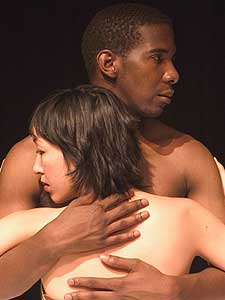|
Audio
Photos
Resources
|
February 8, 2005
 |
| Desean Terry and Katrina Toshiko star in "Slippery When Wet," a play about biracial relationships currently running at Penumbra Theatre in St. Paul. (Photo by Ann Marsden) |
St. Paul, Minn. — Playwright S.H. Murakoshi has first-hand experience with biracial relationships.
"Going out on any date has its nervous-stomach sort of responses. but there was so much more because of the fact that he was African-American, and really dark-skinned and successful," says Murakoshi. "I felt that there was a difference in status, that he was much higher placed in the business and I was much lower."
Murakoshi says she was constantly insecure, plus she had to deal with the stares and comments from people on the street. She realized that as an Asian-American woman, dating a white man was socially acceptable, but dating other non-Asian races was not.
That experience inspired her to write "Slippery When Wet." It's the story of two people who are intensely attracted to one another. Yet they find it awkward just breaking the ice.
Murakoshi says "Slippery When Wet" is, at heart, a "boy-meets-girl" story, but when it's a black man and an Asian woman, layers of complexity are piled on top. Class, gender and politics all become racially charged.
The show was first staged in 1995. Murakoshi believes it's the first time a play has explored such relationships. "Slippery When Wet" incorporates a great deal of movement. Director and co-collaborator Ching Valdes-Aran says at one point a fight gets physical, but not in the way you might think.
"It's a dance. It's almost like a situation where you want to touch each other but you're verbally abusing each other. So it's a dance," says Valdes-Aran.
In addition, the audience gets to listen to what's going on in the heads of the two characters -- their fantasies and their misconceptions about one another. Music director Fred Carl says he enjoys using sounds in the play to create the barriers for different worlds, allowing the audience into a head with one chime, and then pushing them back out with another.
"It's as though a little slice happened and then life, life, life. 'Ding!' Ooh, another thing happened! Then 'ding!' back to life, life, life. I love that kind of thing," says Carl.
Much of the music incorporates breathing, or beating a microphone against a chest to create a heartbeat. Carl says he thinks of the dating process as a sort of ritual, and so he used instruments and sounds that would both evoke a ritual and heighten the sexual tension between the characters.
"Slippery When Wet" playwright S.H. Murakoshi says she only realized she had preconceptions about African-American men when she pushed the limits of her experience.
She says she hopes "Slippery When Wet" will allow audiences to ask themselves questions about how they really feel about biracial relationships. Murakoshi says the play is not only about race, gender and politics, but about self-awareness, and resisting complacency.
"It's about doing the work, and continuing to have hope and to struggle, because it is a struggle," says Murakoshi. "But to have fun in the process, to really have fun with it and to continue to become better human beings."
And that, says Murakoshi, involves taking risks.






